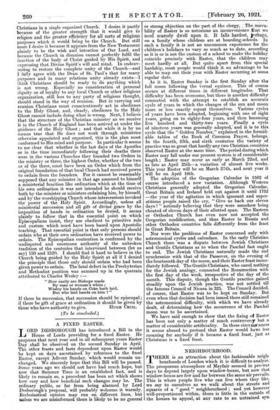A FIXED EASTER.
TDESBOROUGH has introduced a Bill in the House of Lords providing for a fixed Easter. He proposes that next year and in all subsequent years Easter Day shall be observed on the second Sunday in April. The other feasts and fasts dependent upon Easter would be kept on days ascertained by reference to the fixed Easter, except Advent Sunday, which would remain un- changed. We sincerely hope that this Bill will be passed. Some years ago we should not have had much hope, but now that Summer Time is an established fact, and is likely to remain so, a precedent has been set which shows how easy and how beneficial such changes may be. The ordinary public, so - far from being alarmed by Lord Desborough's proposal, will probably welcome it warmly. Ecclesiastical opinion may run on different lines, but unless we are misinformed there is likely to be no general or strong objection on the part of the clergy. The mova bility of Easter is so notorious an inconvenience fiat we
need scarcely dwell upon it. It falls hardest, 13rhaps,
on a family whose children are at boarding-schools. In such a family it is not an uncommon experience for the children's holidays to vary so much as to .date, according as it is or is not the custom of a school to make the holiday coincide precisely with Easter, that the children may meet hardly at all. But quite apart from this special hardship, most people would think it. an advantage to be able to map out their year with Easter occurring at some regular date.
As it is, Easter Sunday is the first Sunday after the full moon following the vernal equinox. This of course occurs at different times in different longitudes. That difficulty has been overcome, but there is another difficulty connected with the attempt to establish an accurate cycle of years in which the changes of the sun and moon more or less exactly repeat themselves. Various cycles of years have been adopted, beginning with one of eight years, going on to eighty-four years, and then becommg five hundred and thirty-two years. Finally a cycle of nineteen years was generally adopted; and it is to this cycle that the " Golden Number," explained in the formid- able tables of the Book of Common Prayer, belongs. In the fourth, fifth, and sixth centuries the variety of practice was so great that hardly any two Christian countries observed Easter at the same time. The period during which Easter may fall under our present system is of considerable length ; Easter may occur as early as March 22nd, and as late as April 25th—a variation of almost five weeks. This year Easter will be on March 27th, and next year it will be on April 16th.
. The adoption of the Gregorian Calendar in 1582 of course introduced a new variation. Although Western Christians generally adopted the Gregorian Calendar, Great Britain and Ireland held out against it until 1752 —the year of the agitation in which ignorant and super- stitious people raised the cry, " Give us back our eleven days ! " seriously believing that they were somehow being cheated of eleven days of their allotted span. The Eastern or Orthodox Church has even now not accepted the Gregorian modification, and thus Easter in Russia and other Orthodox -countries falls differently from the feast in Great Britain.
Nor were the problems of Easter concerned only with astronomical cycles and calendars. In the early Christian Church there was a dispute between Jewish Christians and Gentile Christians as to when the Paschal fast ought to end. The Jewish Christians naturally made the end synchronize with that of the Passover, on the evening of the fourteenth day of the moon, and their Easter feast imme- diately followed. The Gentile Christians, who cared nothing for the Jewish analogy, connected the Resurrection with the first day of the week, irrespective of the day of the month. This dispute, though the Gentile practice gained steadily upon the Jewish practice, was not settled till the famous Council of Nicaea in 325. The Council decided, of Course, that Easter was to be kept on Sunday. But even when that decision had been issued there still remained the astronomical difficulty, with which we have already dealt, of determining how the occurrence of the Paschal moon was to be ascertained.
We have said enough to show that the fixing of Easter has been not only a matter of much controvemy but a matter of considerable artificiality. In these circumstances it seems absurd to pretend that Easter would have less meaning for anybody if it became a fixed feast, just as Christmas is a fixed feast.


































 Previous page
Previous page